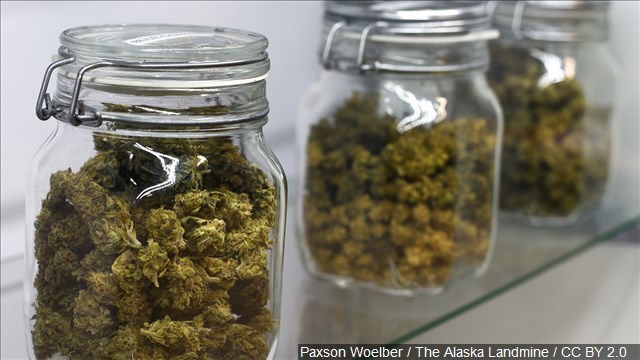Merkley’s cannabis banking bill clears committee hurdle, heads to Senate floor; Wyden, Oregon AG urge passage

WASHINGTON (KTVZ) – Senator Jeff Merkley’s bipartisan Secure and Fair Enforcement Regulation (SAFER) Banking Act – legislation to ensure that legal cannabis businesses have access to critical banking and financial services – cleared a key hurdle by passing the Senate Committee on Banking, Housing, and Urban Affairs.
The SAFER Banking Act now heads to the floor for consideration from the whole Senate, for the first time.
“Forcing legal businesses to operate in all-cash is dangerous for our communities; it’s an open invitation to robberies, muggings, money laundering, and organized crime—and the only people benefiting from the current system are criminals,” said Merkley. “Passing the SAFER Banking Act through committee is an historic moment in this body. I am committed to building bipartisan momentum to finally get a bill signed into law that ends the cannabis cash economy and improves public safety across the nation.”
“This bill is example of significant bipartisan cooperation. I much appreciate the contribution of my Republican colleagues led by Senator Daines, including assistance from Senator Lummis and Senator Cramer. But the bill would not have made it through the Committee without the extensive work of Majority Leader Schumer, Banking Chair Brown, and Senator Sinema.”
Merkley is the lead sponsor of the SAFER Banking Act, as well as its predecessor the SAFE Banking Act – which he has led since 2015. Last week, Merkley reiterated his commitment to supporting the addition of restorative justice provisions – such as the Harnessing Opportunity by Pursuing Expungement (HOPE) Act, which would support states with grants that want to expunge cannabis records; and the Gun Rights and Marijuana (GRAM) Act, which would allow state-legal cannabis users to purchase and possess firearms – when the bill is considered before the full Senate.
In addition, the SAFER Banking Act includes extended safe harbor protections for Community Development Financial Institutions (CDFI) and Minority Depository Institutions (MDI) to ensure they can also serve cannabis businesses.
Senator Ron Wyden, D-Ore., today issued the following statement after the U.S. Senate Banking, Housing, and Urban Affairs Committee passed the Secure And Fair Enforcement Regulation (SAFER) Banking Act:
“The U.S. Senate is finally on its way to making sure that small cannabis businesses can finally get access to banking services just like any other law-abiding businesses – no more wheelbarrows full of cash. The Senate has got to get this important legislation across the finish line for the sake of public safety, for equity, and so that small businesses in my state – and now almost every state -- get the chance to grow and compete.”
Wyden is a co-sponsor of the SAFER Banking Act.
-
Attorney General Rosenblum to Congress:
Pass SAFER Banking To Help Oregon’s State-Licensed Cannabis Businesses
Attorney General Ellen Rosenblum today joined a coalition of 22 Attorneys General in urging congressional leaders to advance the SAFER Banking Act of 2023, which passed out of the Senate Banking Committee this morning and heads to the Senate floor for a full vote. The SAFER Banking Act would lift banking restrictions that prevent legal, regulated, state-licensed cannabis businesses from accessing a full range of regulated banking and financial services.
“It is a dereliction of duty for Congress to continue putting legitimate cannabis businesses in jeopardy by denying them full access to banking services,” said Rosenblum, who has been a consistent voice in support of sensible, enforceable cannabis laws. “Forcing cannabis businesses to operate in cash and denying them access to credit is putting Oregonians who are working hard to grow a legitimate Oregon industry at risk.”
Oregon cannabis sales have totaled nearly $6 billion since the fall of 2016, according to data from the Oregon Liquor and Cannabis Commission. Yet, despite the growing number of states with legally authorized, regulated cannabis businesses, cannabis remains classified as an illegal substance under the federal Controlled Substances Act and certain federal banking statutes. Because cannabis remains classified as an illegal substance, banks providing services to state-licensed cannabis dispensaries and related businesses are at risk for criminal and civil liability.
This risk has significantly inhibited the ability of financial institutions to provide services to regulated cannabis operators and leaves those businesses struggling to find financing. The lack of access to banking services creates both barriers to entry into the industry and instability for existing businesses. In addition, the current banking restrictions constrict state agencies’ effort to collect taxes and conduct oversight. Further, as too many states have seen, when regulated businesses can only conduct business in cash, employees and customers are at greater risk of violent crime in pursuit of that cash.
The Attorneys General argue that passage of the SAFER Banking Act, which will enable regulated banks and financial institutions to provide services to state-licensed cannabis businesses, will enable economic growth, facilitate state oversight of tax obligations, and reduce the public safety risks associated with high-value, cash-based businesses. The SAFER Banking Act would establish a safe harbor for depository institutions providing a financial product or service to a regulated business in states that have regulations to ensure accountability in the cannabis industry.
The Attorneys General argue that an effective safe harbor would bring billions of dollars into the banking sector, enabling law enforcement, federal, state, and local tax agencies, and cannabis regulators in thirty-eight states and several territories to monitor and ensure compliance of cannabis businesses and their transactions more effectively.
Led by Maryland Attorney General Anthony G. Brown, Washington D.C. Attorney General Brian L. Schwalb, and Oklahoma Attorney General Gentner Drummond, the letter is also joined by the Attorneys General of Arizona, California, Colorado, Connecticut, Georgia, Hawaii, Illinois, Massachusetts, Maine, Michigan, New Jersey, New Mexico, Nevada, New York, Pennsylvania, Rhode Island, Vermont, and Washington.



